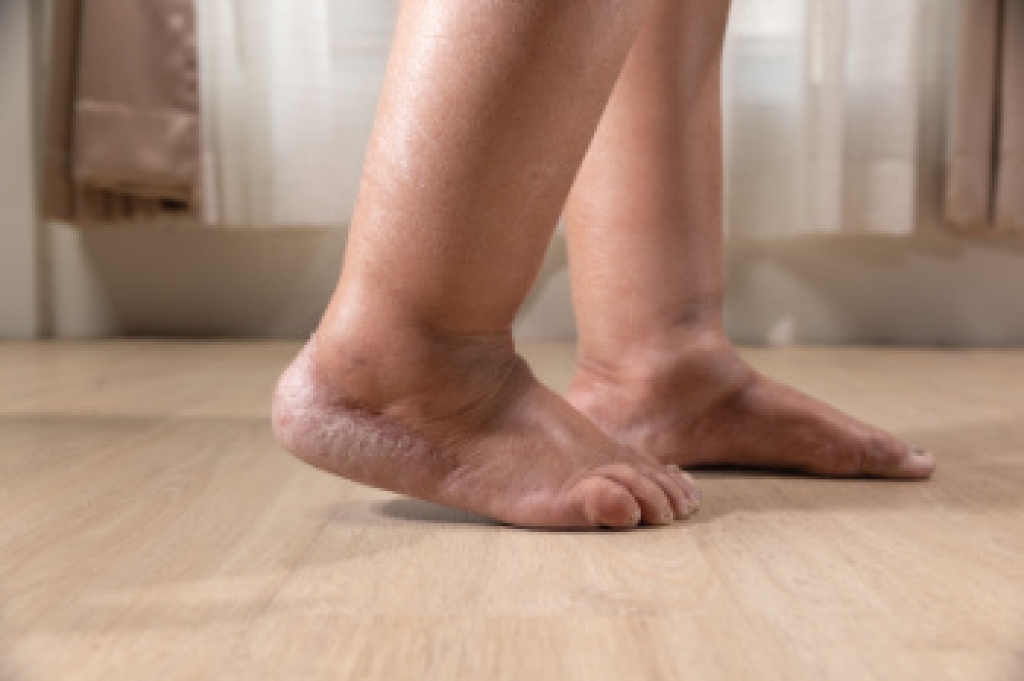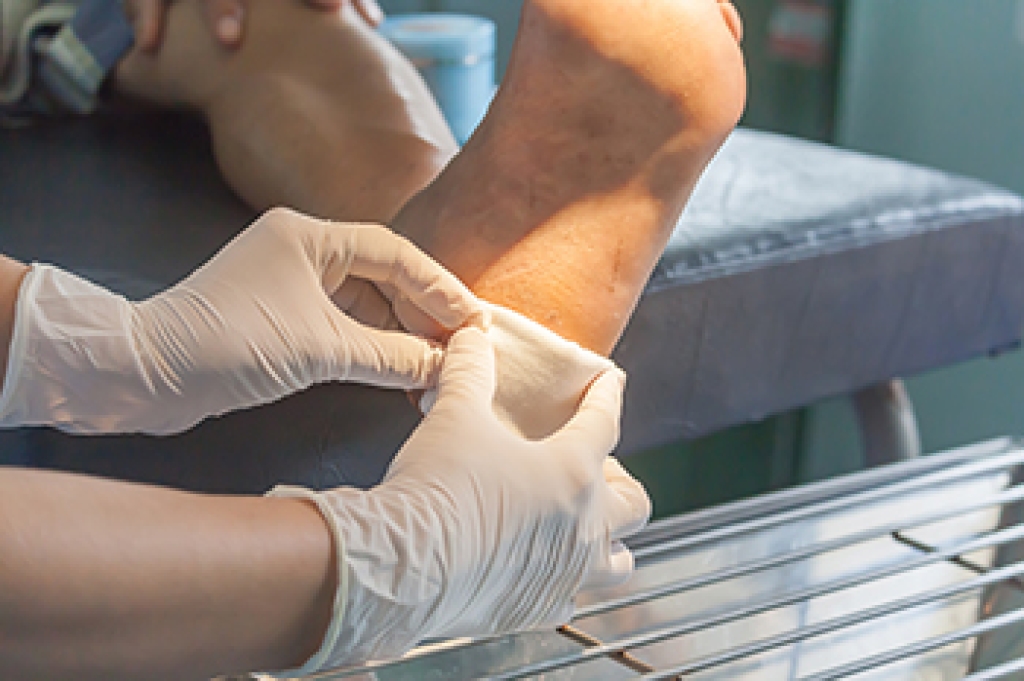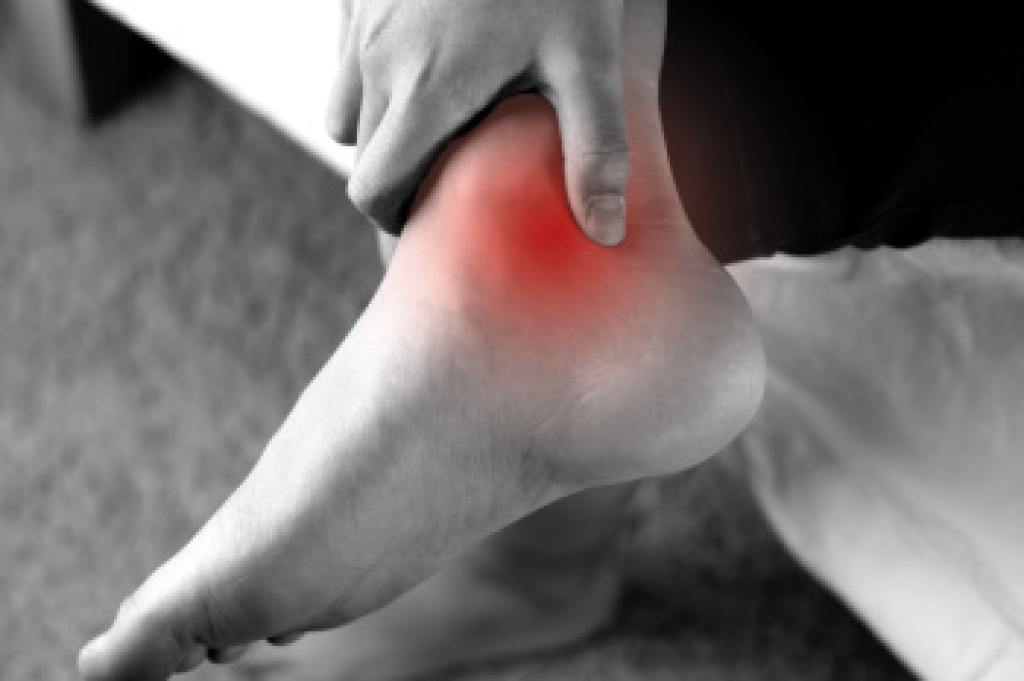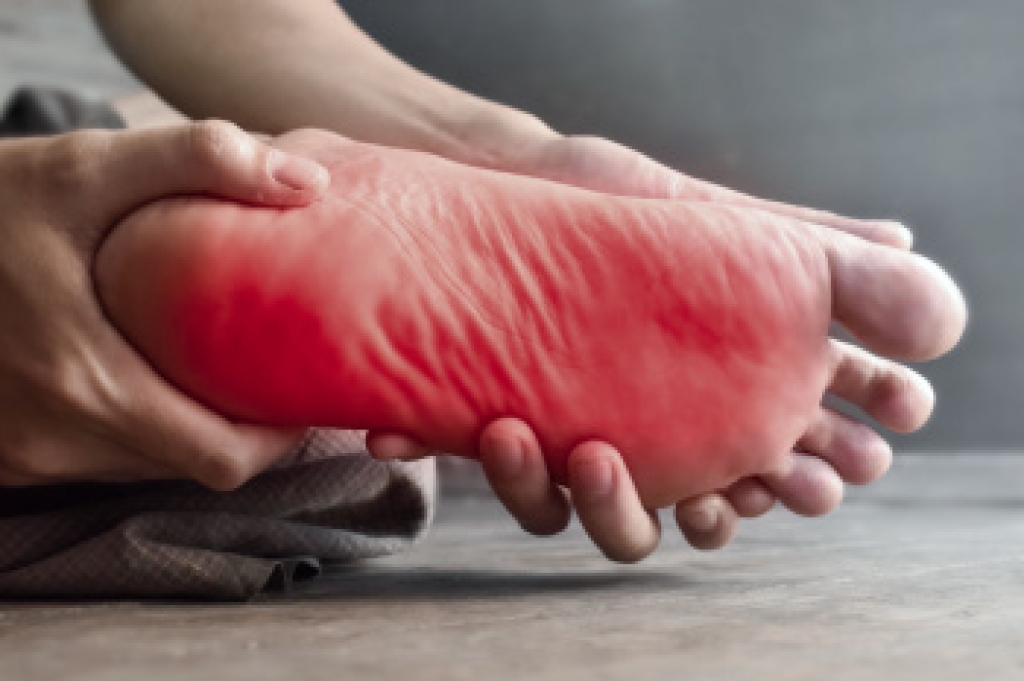Connect With Us
Blog
Blog
Common Reasons for Swollen Feet and Ankles

Swollen feet can result from a variety of causes. One common reason is pregnancy, especially during the third trimester, as the body produces extra blood and fluid retention occurs. This can lead to swelling in the feet and ankles, particularly when standing for long periods of time, or in hot weather. Another cause of swollen feet is injury, such as a sprained ankle. Damage to the injured ligaments can lead to fluid accumulation in the affected area as the body works to heal. Venous insufficiency is another contributor to swollen feet. Damaged veins cause blood to pool in the feet and ankles, resulting in swelling. In some cases, swelling can indicate more serious health issues, including heart, kidney, liver disease, or even blood clots. If you have unexplained swelling in the feet, it is suggested that you schedule an appointment with a podiatrist for a diagnosis and appropriate treatment options.
Swollen feet can be a sign of an underlying condition. If you have any concerns, contact one of our podiatrists of Complete Foot & Ankle Specialists, LLC. our doctors can provide the care you need to keep you pain-free and on your feet.
Swollen feet are a common ailment among pregnant women and people who stand or sit for extended periods. Aging may increase the possibility of swollen feet and patients who are obese often notice when their feet are swelling too. There may be medical reasons why swollen feet occur:
- Phlebitis - A condition that causes the veins to become inflamed and can also cause leg pain.
- Liver disease - This may lead to low blood levels of albumin which is a protein. This can cause fluid in the blood to pass into the tissues and several areas of the body can become swollen.
- Heart failure - When the heart doesn’t pump properly the blood that is normally pumped back to the heart can pool in the veins of the legs causing swollen feet.
- Kidney disease - One of the main functions of the kidneys is releasing excess fluid in the body. This type of condition can make it difficult for the kidneys to function properly, and as a result the feet may become swollen.
- Deep-vein thrombosis (DVT)- This is a serious condition where blood clots form in the veins of the legs. They can block the return of blood from the legs to the heart which may cause the feet to swell. It is important to be treated by a podiatrist if this condition is present.
Swollen feet can also be caused by bone and tendon conditions, including fractures, arthritis, and tendinitis. Additionally, there may be skin and toenail conditions and an infection may cause the feet to swell. Patients who take medicine to treat high blood pressure may be prone to getting swollen feet.
Many patients elevate their feet to help relieve the swelling and this is generally a temporary remedy. When a podiatrist is consulted the reason behind the swelling can be uncovered and subsequently treated.
If you have any questions please contact our offices located in Bellefontaine, OH and Springfield, OH . We offer the newest diagnostic and treatment technologies for all your foot and ankle needs.
Caring for Diabetic Foot Wounds

Diabetic foot wounds can develop when nerve damage causes people to miss signs of pressure, cuts, or irritation on their feet. Poor circulation makes it harder for these wounds to heal, which increases the risk of infection. Wounds often appear on the toes, soles, or heels, especially in spots where shoes rub or pressure builds up from calluses or foot deformities. Because many people with diabetes do not feel pain in their feet, these wounds may go unnoticed and become worse, over time. A podiatrist can examine the wound, check blood flow, test for nerve damage, and provide care to prevent further injury. They can also help reduce pressure on the wound by recommending special footwear or in some cases, surgery. Without proper care, diabetic foot wounds can lead to serious infections and tissue or limb loss. If you notice foot or lower leg wounds that are not healing properly, it is suggested that you schedule an appointment with a podiatrist for safe and effective wound care.
Wound care is an important part in dealing with diabetes. If you have diabetes and a foot wound or would like more information about wound care for diabetics, consult with one of our podiatrists from Complete Foot & Ankle Specialists, LLC. our doctors will assess your condition and provide you with quality foot and ankle treatment.
What Is Wound Care?
Wound care is the practice of taking proper care of a wound. This can range from the smallest to the largest of wounds. While everyone can benefit from proper wound care, it is much more important for diabetics. Diabetics often suffer from poor blood circulation which causes wounds to heal much slower than they would in a non-diabetic.
What Is the Importance of Wound Care?
While it may not seem apparent with small ulcers on the foot, for diabetics, any size ulcer can become infected. Diabetics often also suffer from neuropathy, or nerve loss. This means they might not even feel when they have an ulcer on their foot. If the wound becomes severely infected, amputation may be necessary. Therefore, it is of the upmost importance to properly care for any and all foot wounds.
How to Care for Wounds
The best way to care for foot wounds is to prevent them. For diabetics, this means daily inspections of the feet for any signs of abnormalities or ulcers. It is also recommended to see a podiatrist several times a year for a foot inspection. If you do have an ulcer, run the wound under water to clear dirt from the wound; then apply antibiotic ointment to the wound and cover with a bandage. Bandages should be changed daily and keeping pressure off the wound is smart. It is advised to see a podiatrist, who can keep an eye on it.
If you have any questions please contact our offices located in Bellefontaine, OH and Springfield, OH . We offer the newest diagnostic and treatment technologies for all your foot and ankle needs.
Tarsal Tunnel Syndrome and Its Impact on Foot Health

Tarsal tunnel syndrome is a condition where the posterior tibial nerve becomes compressed as it passes through the tarsal tunnel along the inner ankle. This can cause pain, tingling, numbness, or burning sensations in the foot and ankle. Common causes include flat feet, swelling, injuries, or conditions that place pressure on the nerve. Symptoms often worsen with prolonged walking or standing and risk factors include obesity, diabetes, and repetitive strain on the foot. A podiatrist can diagnose tarsal tunnel syndrome, provide imaging or nerve testing, and recommend treatments such as orthotics or minimally invasive procedures. If you have pain on the inside of your ankle, it is suggested that you consult a podiatrist who can accurately diagnose and treat the problem.
Tarsal tunnel syndrome can be very uncomfortable to live with. If you are experiencing tarsal tunnel syndrome, contact one of our podiatrists of Complete Foot & Ankle Specialists, LLC. our doctors can provide the care you need to keep you pain-free and on your feet.
Tarsal Tunnel Syndrome
Tarsal tunnel syndrome, which can also be called tibial nerve dysfunction, is an uncommon condition of misfiring peripheral nerves in the foot. The tibial nerve is the peripheral nerve in the leg responsible for sensation and movement of the foot and calf muscles. In tarsal tunnel syndrome, the tibial nerve is damaged, causing problems with movement and feeling in the foot of the affected leg.
Common Cause of Tarsal Tunnel Syndrome
- Involves pressure or an injury, direct pressure on the tibial nerve for an extended period of time, sometimes caused by other body structures close by or near the knee.
- Diseases that damage nerves, including diabetes, may cause tarsal tunnel syndrome.
- At times, tarsal tunnel syndrome can appear without an obvious cause in some cases.
The Effects of Tarsal Tunnel Syndrome
- Different sensations, an afflicted person may experience pain, tingling, burning or other unusual sensations in the foot of the affected leg.
- The foot muscles, toes and ankle become weaker, and curling your toes or flexing your foot can become difficult.
- If condition worsens, infections and ulcers may develop on the foot that is experiencing the syndrome.
A physical exam of the leg can help identify the presence of tarsal tunnel syndrome. Medical tests, such as a nerve biopsy, are also used to diagnose the condition. Patients may receive physical therapy and prescriptive medication. In extreme cases, some may require surgery.
If you have any questions please contact our offices located in Bellefontaine, OH and Springfield, OH . We offer the newest diagnostic and treatment technologies for all your foot and ankle needs.
Diabetic Peripheral Neuropathy and Protecting Your Feet from Silent Damage

Diabetic peripheral neuropathy is a condition where prolonged high blood sugar damages the nerves, especially in the legs and feet. This nerve damage can cause tingling, burning, numbness, or sharp pain. Common causes include poorly managed diabetes, poor circulation, and prolonged elevated glucose levels. Among the risk factors are long-term diabetes, smoking, and high blood pressure. As the feet lose sensation, injuries may go unnoticed, leading to ulcers or infections. A podiatrist can detect early nerve damage, provide foot care guidance, and help prevent complications through regular screenings and protective strategies. If you experience unusual sensations or numbness in your feet, it is suggested that you visit a podiatrist for a thorough evaluation and effective relief and management tips.
Neuropathy
Neuropathy can be a potentially serious condition, especially if it is left undiagnosed. If you have any concerns that you may be experiencing nerve loss in your feet, consult with one of our podiatrists from Complete Foot & Ankle Specialists, LLC. our doctors will assess your condition and provide you with quality foot and ankle treatment for neuropathy.
What Is Neuropathy?
Neuropathy is a condition that leads to damage to the nerves in the body. Peripheral neuropathy, or neuropathy that affects your peripheral nervous system, usually occurs in the feet. Neuropathy can be triggered by a number of different causes. Such causes include diabetes, infections, cancers, disorders, and toxic substances.
Symptoms of Neuropathy Include:
- Numbness
- Sensation loss
- Prickling and tingling sensations
- Throbbing, freezing, burning pains
- Muscle weakness
Those with diabetes are at serious risk due to being unable to feel an ulcer on their feet. Diabetics usually also suffer from poor blood circulation. This can lead to the wound not healing, infections occurring, and the limb may have to be amputated.
Treatment
To treat neuropathy in the foot, podiatrists will first diagnose the cause of the neuropathy. Figuring out the underlying cause of the neuropathy will allow the podiatrist to prescribe the best treatment, whether it be caused by diabetes, toxic substance exposure, infection, etc. If the nerve has not died, then it’s possible that sensation may be able to return to the foot.
Pain medication may be issued for pain. Electrical nerve stimulation can be used to stimulate nerves. If the neuropathy is caused from pressure on the nerves, then surgery may be necessary.
If you have any questions, please feel free to contact our offices located in Bellefontaine, OH and Springfield, OH . We offer the newest diagnostic and treatment technologies for all your foot care needs.

